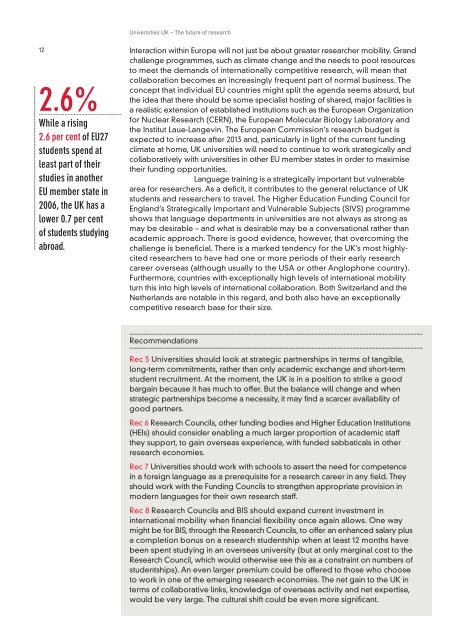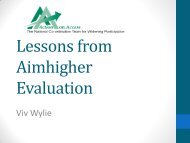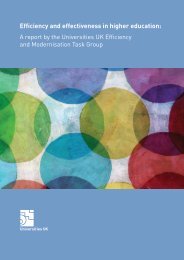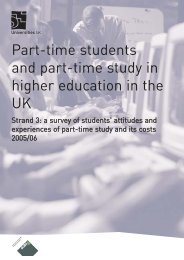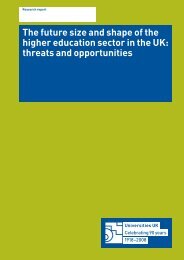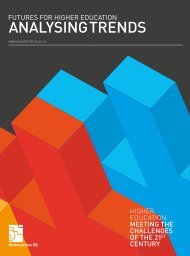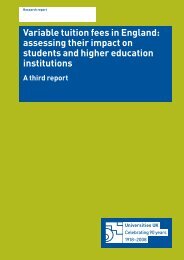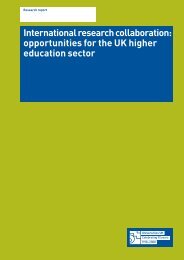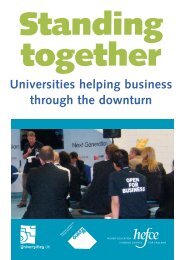The future of research - Universities UK
The future of research - Universities UK
The future of research - Universities UK
Create successful ePaper yourself
Turn your PDF publications into a flip-book with our unique Google optimized e-Paper software.
<strong>Universities</strong> <strong>UK</strong> – <strong>The</strong> <strong>future</strong> <strong>of</strong> <strong>research</strong><br />
12<br />
2.6%<br />
While a rising<br />
2.6 per cent <strong>of</strong> EU27<br />
students spend at<br />
least part <strong>of</strong> their<br />
studies in another<br />
EU member state in<br />
2006, the <strong>UK</strong> has a<br />
lower 0.7 per cent<br />
<strong>of</strong> students studying<br />
abroad.<br />
Interaction within Europe will not just be about greater <strong>research</strong>er mobility. Grand<br />
challenge programmes, such as climate change and the needs to pool resources<br />
to meet the demands <strong>of</strong> internationally competitive <strong>research</strong>, will mean that<br />
collaboration becomes an increasingly frequent part <strong>of</strong> normal business. <strong>The</strong><br />
concept that individual EU countries might split the agenda seems absurd, but<br />
the idea that there should be some specialist hosting <strong>of</strong> shared, major facilities is<br />
a realistic extension <strong>of</strong> established institutions such as the European Organization<br />
for Nuclear Research (CERN), the European Molecular Biology Laboratory and<br />
the Institut Laue-Langevin. <strong>The</strong> European Commission’s <strong>research</strong> budget is<br />
expected to increase after 2013 and, particularly in light <strong>of</strong> the current funding<br />
climate at home, <strong>UK</strong> universities will need to continue to work strategically and<br />
collaboratively with universities in other EU member states in order to maximise<br />
their funding opportunities.<br />
Language training is a strategically important but vulnerable<br />
area for <strong>research</strong>ers. As a deficit, it contributes to the general reluctance <strong>of</strong> <strong>UK</strong><br />
students and <strong>research</strong>ers to travel. <strong>The</strong> Higher Education Funding Council for<br />
England’s Strategically Important and Vulnerable Subjects (SIVS) programme<br />
shows that language departments in universities are not always as strong as<br />
may be desirable – and what is desirable may be a conversational rather than<br />
academic approach. <strong>The</strong>re is good evidence, however, that overcoming the<br />
challenge is beneficial. <strong>The</strong>re is a marked tendency for the <strong>UK</strong>’s most highlycited<br />
<strong>research</strong>ers to have had one or more periods <strong>of</strong> their early <strong>research</strong><br />
career overseas (although usually to the USA or other Anglophone country).<br />
Furthermore, countries with exceptionally high levels <strong>of</strong> international mobility<br />
turn this into high levels <strong>of</strong> international collaboration. Both Switzerland and the<br />
Netherlands are notable in this regard, and both also have an exceptionally<br />
competitive <strong>research</strong> base for their size.<br />
Recommendations<br />
Rec 5 <strong>Universities</strong> should look at strategic partnerships in terms <strong>of</strong> tangible,<br />
long-term commitments, rather than only academic exchange and short-term<br />
student recruitment. At the moment, the <strong>UK</strong> is in a position to strike a good<br />
bargain because it has much to <strong>of</strong>fer. But the balance will change and when<br />
strategic partnerships become a necessity, it may find a scarcer availability <strong>of</strong><br />
good partners.<br />
Rec 6 Research Councils, other funding bodies and Higher Education Institutions<br />
(HEIs) should consider enabling a much larger proportion <strong>of</strong> academic staff<br />
they support, to gain overseas experience, with funded sabbaticals in other<br />
<strong>research</strong> economies.<br />
Rec 7 <strong>Universities</strong> should work with schools to assert the need for competence<br />
in a foreign language as a prerequisite for a <strong>research</strong> career in any field. <strong>The</strong>y<br />
should work with the Funding Councils to strengthen appropriate provision in<br />
modern languages for their own <strong>research</strong> staff.<br />
Rec 8 Research Councils and BIS should expand current investment in<br />
international mobility when financial flexibility once again allows. One way<br />
might be for BIS, through the Research Councils, to <strong>of</strong>fer an enhanced salary plus<br />
a completion bonus on a <strong>research</strong> studentship when at least 12 months have<br />
been spent studying in an overseas university (but at only marginal cost to the<br />
Research Council, which would otherwise see this as a constraint on numbers <strong>of</strong><br />
studentships). An even larger premium could be <strong>of</strong>fered to those who choose<br />
to work in one <strong>of</strong> the emerging <strong>research</strong> economies. <strong>The</strong> net gain to the <strong>UK</strong> in<br />
terms <strong>of</strong> collaborative links, knowledge <strong>of</strong> overseas activity and net expertise,<br />
would be very large. <strong>The</strong> cultural shift could be even more significant.


